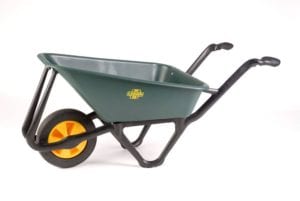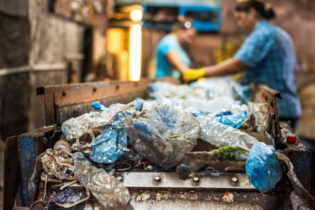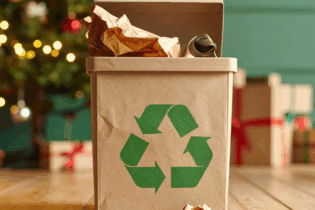At a swanky function Gallagher Estate in Midrand, 37 entries into the best recycled product of the year, hosted by the South African Plastics Recyclers Organisation (Sapro), with the support of Plastics|SA and the Packaging Council of South Africa (Pacsa), waited with baited breath for the announcement of the awards. This competition was one of the highlights of the local plastic industry’s Clean Up South Africa Week (10-16 September), and encouraged brand owners and industrial designers to consider recycled plastics as a material of choice. Brand owners from around the country, retailers and association leaders attended the ‘Oscars of the plastics industry’ which celebrated innovation, sustainability and technical developments in the recycling industry.
According to Douglas Greig, the chairman of Sapro, they were “thrilled with both the quality and quantity of the entries received, proving that the plastics recycling industry is growing in size, sophistication and value.” The criteria were tough. A panel of experts evaluated the life expectancy of the product, the sustainability and long-term market demand and acceptance, potential tonnage of material diverted from landfills, replacement of alternative materials, technical achievements, product consistency and the potential to create awareness of plastics recycling. Four products received awards in the following categories: Judges’ Special Mention (Merit) Award: The Bottleworx Building System particularly impressed the judges with its unique building system that is based on re-using specially designed PET bottles of 500 ml, 1 l and 2 l volumes to fill and insulate walls. Using an interlocking cubic design, Bottleworx transforms ordinary packaging into a multi-functional material that permanently removes plastic and other waste from the environment. Empty containers are up-cycled to be used as building blocks for almost anything and can be used to build houses, schools, clinics as well as bed bases, couches and even educational toys. Novel and Artistic Products: The Silver Award in this category went to the Tabitha Star Light entered by the Libere Foundation. This stunning light is made from PET beverage bottles and was designed by 16-year-old Tabitha van der Merwe from George. It is a real novelty item with good aesthetic appeal and will draw attention to the re-use of waste packaging. The Gold Award went to the Eco Smart Group for their Geyser Blanket. This entry impressed the judges with its relevance in saving energy as well as utilising waste materials. The fact that it sells for less than the official geyser blankets in the market is excellent despite the labour intensive nature of the manufacturing process. “The product has enormous potential to create awareness”, Greig explained.Mixed Recycled Materials: In this category, the judges particularly looked at the originality of the design and if the product was well put together. In most instances, the polyolefins are blended together, such as low density polyethylene, high density polyethylene and polypropylene. Other, non-plastic materials such as sand, wood dust, saw dust, and cellulose or wheat chaff can also be mixed with the plastics. These bulky durable products are normally huge and heavy and consume high tonnages of materials but only a few of each design is typically made by a manufacturer. The Silver Award in the category ‘mixed materials’ was awarded to New Life Plastics for their Tree Hugger Bench. The raw material (planks) were sourced from Extruwood and designed and manufactured by New Life Products in Cape Town. The strong, simple design results in a product that will fit just about anywhere. It will look equally good in a public park or garden as it will in a suburban private garden. The assembled tree hugger bench was exceptionally steady, which impressed the judges. The Gold Award was awarded to the Cyclo Roof Tiles entered by Cyclocor KZN. This company only opened their doors in May 2012 with the manufacturing of roof tiles, but already boast several designs in various colours. They managed to secure off-take agreements for 100 % of their current production capacity of 100 000 tiles monthly. The waste plastics are sourced from community-based waste management companies and collectors. The tiles will reduce the building cost of houses as the reduced weight necessitates fewer trusses and roof support beams. Products containing a certain percentage post-consumer recycled content: Brand owners are under constant pressure from the environmentally conscious consumer to become more ‘green’. Consumers want to know that their packaging and plastics products are not damaging the environment and there is a major tendency for consumers to want to ‘feel good’ and to be ‘doing the right thing’ when they are buying a product. However, the average consumer is not prepared to sacrifice his popular brand or to make any sacrifices himself. He instead looks to the brand owner to assist him in his environmentally conscious decisions. The first Silver Award in this category was awarded to the Unilever Sunlight dishwashing liquid bottle. “Recycled PET (RPET) only recently became available in South Africa and the demand exceeds the supply. At current production levels, 300 tonnes of PET is kept away from landfill. Standing on just about every kitchen zinc in the country today is a bottle of Sunlight Dishwashing Liquid that contains 25% of recycled PET,” said Greig. Unilever is aiming to produce the bottle from 100% RPET as soon as they can get enough of it. It is crucial that leading brands such as this, should lead the way in educating consumers as to the merits of recycling and the positive impact that this move has and will have on the environment.
A second Silver Award in this category was awarded to Southgate Recycling for their Lavaplastic range of products. This woven lattice was originally developed for fencing in coastal dune rehabilitation. The demand for lavaplastic has subsequently developed for the domestic DIY market for garden screening, edging, outdoor furniture and decoration. This PVC product is maintenance free and has an estimated life span of more than 30 years. The recyclable materials for the lattices are obtained from industrial- as well as post-consumer PVC waste.
The Gold Award in the category for products containing a certain percentage post-consumer recycled content was awarded to the Lasher Ecobarrow. Consumers are bombarded with a wide range of tools and utensils in the DIY, gardening, construction and agricultural market with the bulk of the products being imported to South Africa from the Far East. Lasher’s Proudly South African Ecobarrow, however, sports a design that was clearly and properly thought-through. The end result was an attractive, ergonomically pleasing product that will outlive most of its users whilst maintaining the strong brand identity. Lasher obtained the moulding technology to manufacture the complete product in-house with state of the art equipment. Only the rim and axle are made from virgin materials. Product made from 100% recyclate: Sapro received 11 entries in the 100% recycled material category. Recycled material from industrial and post-consumer sources qualified. The judges evaluated the products for their fit-for-purpose and consumer acceptance. Due to the inconsistency of raw material of this nature, attention was also given to the technical achievements of the manufacturer to ensure process stability and product consistency. This is also the category that utilised the highest tonnage of post-consumer waste. In this highly competitive category there were also two Silver Awards. The first Silver Award went to the Tuffy refuse bag. “Tuffy runs 6 000 tonnes of material through its plant every year, equating to 240 million refuse bags. The company manufactures all its black refuse bags from 100% recycled material, the majority of which is post-consumer. Tuffy has become the first organisation in South Africa to receive SGS accreditation for having fully recycled content in their refuse bags,” said Rory Murray of Tuffy. The second Silver Award was awarded to M & S Plastics for their chicken nests. “The nest is blow moulded from mixed colour recycled high density polyethylene and used by breeding farmers and egg laying farms especially for free range eggs. M & S Plastics modified an existing mould with an insert to be able to prevent recapitalising. The nest is well designed, with a pronounced ‘lip’ in the front which prevents wood shavings, a major expense to chicken farmers, from being kicked out of the nest. The judges applauded the way that a solution was developed to save the customer considerable cost without incurring large cost themselves.” The Gold Award in the category 100% recycled content went to the rPET Lomold pallet by Lomold. The biggest challenge with plastic pallets today is the ability to match wood pallets both in cost and load carrying capacity. In order to match the desired cost profile, the weight of the Lomold pallet needed to be approximately half that of equivalent plastic pallets, while still delivering high performance. Overall winner for 2012: The evening belonged to the Ecobarrow, manufactured and distributed by Lasher Tools and the recipients of the Pacsa Trophy for Best Recycled Products. Lasher Tools were also finalists in the category for products containing a certain percentage post-consumer recycled content with their poly hoe and poly pick handles. Lasher is the largest manufacturer of these products in the southern hemisphere with a range in excess of 1200 different stock items. Their products go into the DIY, construction, mining, agriculture and industrial markets. Due to Lasher’s focus on quality and service, Lasher today is recognised as a top brand with the well-known slogan of “Tough, Reliable Tools Guaranteed”. Due to increasing steel prices and market demand for better quality tools, Lasher began to explore the possibilities of making better quality traditional products using different materials. With the world focussing on environmental issues, Lasher embarked on a mission to use recycled plastic as one of its main components in manufacturing. At the close of the evening, Greig said, “This year’s awards have once again proven that South Africa is amongst the world’s leaders in mechanical recycling of its plastics products. Each of the entries we received was a winner in its own right. The quality of the products are improving each year as brand owners become ever mindful of consumer acceptance and the aesthetic appeal of their products. At the end, the entries that showed long-term environmental commitment without superfluous green washing and proved that recycled plastic can be both beautiful as it is strong, durable and environmentally responsible as it ensures that the material and the energy is not lost.






